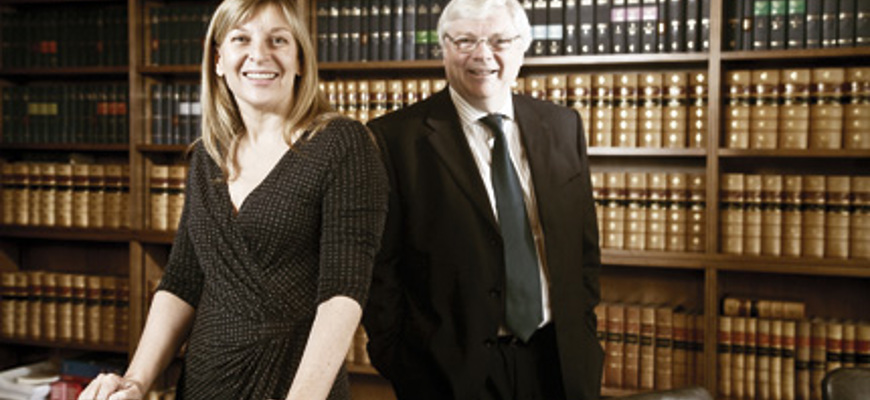Practice ground

The advice and guidance available from the Professional Practice team is often considered the Law Society of Scotland’s most valued service to its members. In the latest survey, 49% said they had consulted the team at some point in their career. And although now five solicitors strong, for many the name of Bruce Ritchie, its head for the past 20 years, has become pretty much synonymous with the team. Now, however, he is heading for a well earned retirement. What changes will that entail?
One would not readily confuse Ritchie with his successor Coral Riddell (the emphasis is on the second syllable). Recently recruited from Pinsent Masons, she has, like Ritchie, the benefit of over a decade in private practice, though whereas his former life was as litigation partner at a small city firm, Riddell, while also a litigator, has a corporate and commercial background in an international practice (she suggests the team should develop more links with the big firms, who now take in about 30% of the Society’s membership).
A ski instructor in her spare time, she also claims relevant experience in a membership organisation, having been legal director of the British Association of Snowsport Instructors. Like the Society, BASI has been modernising and attempting to engage more with its members and, says Riddell: “I suppose that gave me a taste for working with a membership body and understanding what the members are doing.”
But the focus on change at the top should not detract from the experience of the other solicitors – Fiona J Robb (also secretary to the Civil Justice Committee) and Stella McCraw, both with several years’ service in the team; John Scott, secretary to the Property Law Committee; and Alison McKay, who moved over this year from the Regulation Department and also serves the Technology Committee. Each also has many years prior experience in private practice.
Growth and diversity
How is the work divided among a team of this size? “We’re lucky,” Riddell comments, “because everyone’s pretty skilled across the board and a lot of the enquiries we deal with are about general practice: conflicts of interest, confidentiality, you don’t need a particular specialism, but it is a strength in the team that we do have people with conveyancing, private client and litigation backgrounds.”
The growth in the team, Ritchie explains, from his early days when there was just himself and a secretary, in part reflects the growth in the profession and in part the variety of problems it now deals with. “But the most important single factor was the coming into force of the Proceeds of Crime Act and the Money Laundering Regulations. It was decided that, because the Guarantee Fund team would have to monitor compliance with the rules, they couldn’t give advice about these matters because there would be a conflict with their regulatory role. So Professional Practice was nominated to give advice on compliance. And suddenly, because solicitors realised that they could go to jail if they got this wrong, the volume of enquiries increased within months by 50%. It was a huge increase, so we needed to strengthen the team.”
He adds: “The volume of enquiries has also increased partly because there’s a greater awareness of the service that we offer, and secondly because the number of rules and guidelines has increased, and if you increase awareness of these issues you increase the number of enquiries.”
Comfortingly, he continues: “Most of the enquiries are from people simply seeking reassurance that they have got it right, and almost always they have.” Not invariably, however. “You get a vast range of enquiries, covering the full spectrum of the work that the profession’s doing, and the truth is that if a Scottish solicitor is doing some work on something somewhere, there’s a possibility that a practice enquiry might come out of it.”
Comfort factor
Riddell comments that while there is a reasonable level of awareness of ethical issues in the profession: “It’s probably a luxury in the Professional Practice team that you actually get to spend time thinking about these things and I think that’s the key strength to the team, because in practice solicitors are so busy earning fees that when an issue comes up you don’t really have the time or opportunity to look it up and deal with it. Perhaps the bigger firms are lucky because they benefit from ethics committees or risk management processes, whereas smaller firms quite often don’t have that resource or a person to bounce something off and get reassurance. That’s where the team are invaluable. To be successful in this job you have to have judgment and be prepared to make a decision.”
“Absolutely,” Ritchie adds. “When people are phoning in they are looking for an answer. We give them guidance and advice; we’re not here to give instructions, and we tell them it’s their decision. But if they’ve sought guidance and follow it, as most do, that will stand them in good stead later on if there’s any challenge. And obviously if they’ve sought guidance and ignored it, that would also be taken into account if there’s any subsequent difficulty or complaint about their conduct.”
Evolution, law firm style
Another growth area is likely to be advice on different practice structures. Solicitors proposing innovative ways of organising their business are already receiving help from the team, and that will only increase as alternative business structures are introduced. Some options are not new: as Ritchie points out, incorporated practices have been permitted since 1987, though until LLPs came on the scene in 2001, only three had ever been formed, and these were in unusual types of practice. Now, he says, about 30% of practices have some form of limited liability, though among small firms the figure is rather lower (and the proportion of practice units with a sole principal is now over 50%, its highest certainly in Ritchie’s time).
One query concerns trainees: can a trainee be employed by a service company? “The answer is yes they can, provided there is a separate training contract with the solicitors’ practice. Because all our regulations require for trainees is a training contract. The contract of employment is a different contract. Usually the two are combined in the same contract, but they don’t have to be.”
So he regards the profession as quite adaptable, if you give it time. “My own view is that there will be a takeup of licensed providers. It won’t be the damp squib that licensed conveyancers was, because there’s a demand from within the profession, but it will be relatively slow. Some traditional law firms have already publicly stated their intention to bring in some non-lawyers into the partnership. I don’t see this being a revolution in Scotland, but I do see it as part of the process of the profession adapting to different practice models on a gradual evolutionary basis, rather than a wholesale kind of turnround.”
Love of the job
How will the team move forward, under new leadership? “You can expect to see more and more from us,” Riddell promises. “We have very capable people and the plan is to roll out questions and articles from them in the Journal and on the website.” The latter, with its standalone, separately searchable section containing all the practice rules and guidance, is already well used. The seminar programme will continue, and perhaps branch into online (Riddell appears more comfortable than Ritchie at speaking to camera). But Ritchie isn’t completely departing the scene: the second edition of the well regarded book he co-authored with Alan Paterson is scheduled for 2014.
He bows out with a perhaps surprising word of thanks – not only to his team for their help and support, but: “To members of the profession, for making my life so interesting over the past 20-odd years… there have been some sombre moments, but in the main it has been a joy and a pleasure to come in to work. This is the best job that a solicitor in Scotland could have.”
There’s always one
You might think that after 20 years Bruce Ritchie would no longer be surprised by a practice question, but he says his silliest one came up just recently, along these lines: “My wife and I are selling a small flat; we have clients who want to buy it; can we act for the clients? And the answer is, of course you can’t act for the clients, you’re the sellers, how can you possibly give independent advice? To which the response was, supposing my wife and I instruct a different firm, can we still act for the buyers? And I have to say I think that is without question the most ridiculous query I’ve had in 20-odd years, and the solicitors in question should have known better.”
In this issue
- Barriers to sibling contact
- Legal rights, second families and siblingship
- "I'm a chicklet and I live in a hatchery"
- And our survey says...
- No overtaking?
- Reading for pleasure
- Opinion column: Martin Morrow
- Book reviews
- Council profile
- President's column
- 2012: new starts, and challenges
- Independence before the law
- Who do you think they are?
- The expert approach
- Is all publicity good publicity?
- Turning point?
- Young and guilty
- Doubly secure
- Forced marriage: an update
- New age, new image
- A security loophole
- Quit while you're ahead
- When threats are enough
- Practice ground
- Mergers: keeping people onside
- Law reform roundup
- PI Guidelines: new edition
- Ask Ash
- Business radar






